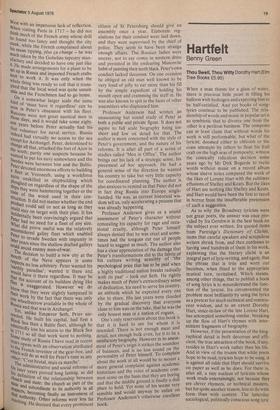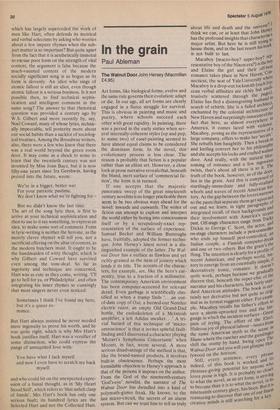Hartfelt
Benny Green
Thou Swell, Thou Witty Dorothy Hart (Elm Tree Books £5.95)
When a man thirsts for a glass of water, there is precious little point in filling his balloon with hydrogen and expecting him to be half-satisfied. And yet books of songlyrics continue to be published. The relationship of words and music in popular art is so symbiotic that to divorce one from the other is a perilous business. The composer can at least claim that without words his work is still performable, but what of the lyricist, doomed either to oblivion or the crass attempts by others to float his frail craft on the high seas of pomposity, witness the comically ridiculous decision some years ago by Mr Dirk Bogarde to recite words without music on a record album whose sleeve notes compared the work of the likes of Lorenz Hart with the sublimer effusions of Shelley and Keats. But the likes of Hart are nothing like Shelley and Keats, and Hart would have been the first to recoil in horror from the insufferable pretension of such a suggestion.
As to why ,the Broadway lyricists were not great poets, the answer was once provided by Ira Gershwin in the best book on the subject ever written. Ira quoted items from Partridge's Dictionary of Cliches, items that careful speakers and scrupulous writers shrink from, and then confesses to having used hundreds of them in his work, explaining that the literary cliche is an integral part of lyric-writing, and again, that the phrase that is trite and worn out becomes, when fitted to the appropriate musical turn, revitalised. Which means, among other things, that to publish a book of song lyrics is to misunderstand the function of the lyricist. Ira circumvented the problem most brilliantly by using the lyrics as a pretext for much technical and reminiscent wisdom, and to an extent Dorothy Hart, sister-in-law of the late Lorenz Hart, has attempted something similar, breaking up the flow of Hart's rhymes with intermittent fragments of biography.
However, if the presentation of the biographical detail is both decorous and efficient, the true attraction of the book, if any, resides in Hart's work rather than his life. And in view of the truism that while poets hope to be read, lyricists hope to be sung, it is against all odds that Hart should survive on paper as well as he does. For there is, after all, a tiny nucleus of lyricists whose work reads entertainingly, not because they are clever rhymers, or technical masters, but for quite another reason, less to do with form than with content. The latterday sociological, politically conscious song lyric which has largely superceded the work of men like Hart, often defends its metrical and verbal solecisms by asking who worries about a few impure rhymes when the subject matter is so important? But quite apart from the fact that it is aesthetically immoral to excuse poor form on the strength of vital content, the argument is false because the much-vaunted content of the modern socially significant song is as bogus as its form is slovenly. An idiot who sings of atomic fallout is still an idiot, even though atomic fallout is a serious business. Is it not possible then, to find technical sophistication and intelligent comment in the same song? The answer to that rhetorical question was provided a century ago by W.S. Gilbert and more recently by, say, Noel Coward, many of whose lyrics, technically impeccable, tell posterity more about our social habits than a sacklot of sociological treatises. Among the Broadway writers, also, there were a few who knew that there was a real world beyond the green room door. It may come as a shock to some to learn that the twentieth century was not invented by Miss Joan Baez, but it is now fifty-one years since Ira Gershwin, having peered into the future, wrote: We're in a bigger, better war For your patriotic pastime.
We don't know what we're fighting for — But we didn't know the last time. The art of the song lyric then, is first to arrive at your technical sophistication and then to use to it say something, to express an idea, to make some sort of comment. Form in lyric-writing is neither the heroine, as the merely clever rhymer will tell you, nor a sacrificial offering on the altar of content, as the modern butchers insist. It ought to be the handmaiden of witty thought, which is why Gilbert and Coward have survived even among the tone-deaf. So far as ingenuity and technique are concerned, Hart was as cute as they come, writing, 'I'll go to hell for ya, or Philadelphia', and often integrating his inner rhymes so cunningly that most singers never even noticed: Sometimes I think I've found my hero, but it's a queer ro mance.
But Hart always insisted he never needed mere ingenuity to prove his worth, and he was quite right, which is why Mrs Hart's book justifies itself. Hart was a versifier of some distinction, who could express the pangs of unrequited love with: You have what I lack myself and now I even have to scratch my back myself.
and who could hit on the unexpected expression of a banal thought, as in 'My Heart Stood Still', which refers to that unfelt clasp of hands'. Mrs Hart's book has only one serious fault; its hundred lyrics are the Selected Hart and not the Collected Hart.































 Previous page
Previous page